普京英文简介
Putin-俄罗斯总统普京英语介绍PPT
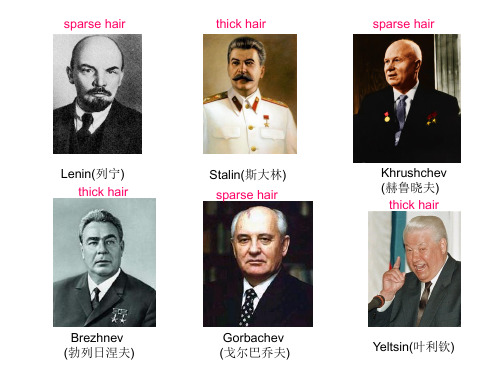
thick hair
sparsehair
Stalin(斯大林) sparse hair
Khrushchev (赫鲁晓夫)
thick hair
Brezhnev (勃列日涅夫)
Gorbachev (戈尔巴乔夫)
Yeltsin(叶利钦)
sparse hair
He can be a spy or a pilot.
He can be the Person of the Year of TIME.
(年度人物)
He gets on well with leaders from other country.
He can be kind.
But he is still the president...
作品欣赏 谢谢观看!
Judo (柔道)
• Good Judoka (柔道运动员) • Law major in Leningrad State University
• Good at skiing • Kazakhstan (哈萨克斯坦) • In 2002
He can be a strong soider.
Do what a man should do: Protect his country.
thick hair
• Putin • (普京)
• Medvedev • (梅德韦杰夫)
Putin——The president of Russia
Putin
• Born in 1952 • 61-year-old
• As president: • 2000-2008 & 2012-now • 10 years
Now, he is no longer young. But he never stop trying to make Russia better and better. Let's give him our best wishes.I hope he can achieve his goal. Come on, man!
普京的英文介绍作文
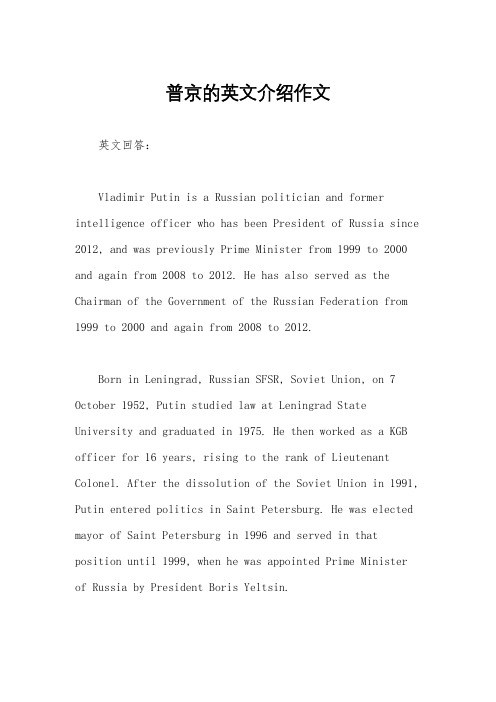
普京的英文介绍作文英文回答:Vladimir Putin is a Russian politician and former intelligence officer who has been President of Russia since 2012, and was previously Prime Minister from 1999 to 2000 and again from 2008 to 2012. He has also served as the Chairman of the Government of the Russian Federation from 1999 to 2000 and again from 2008 to 2012.Born in Leningrad, Russian SFSR, Soviet Union, on 7 October 1952, Putin studied law at Leningrad State University and graduated in 1975. He then worked as a KGB officer for 16 years, rising to the rank of Lieutenant Colonel. After the dissolution of the Soviet Union in 1991, Putin entered politics in Saint Petersburg. He was elected mayor of Saint Petersburg in 1996 and served in that position until 1999, when he was appointed Prime Minister of Russia by President Boris Yeltsin.As Prime Minister, Putin oversaw a period of economic growth and stability in Russia. He also played a key rolein the Second Chechen War. In 2000, Putin was elected President of Russia, and was re-elected in 2004 and 2012. During his presidency, Putin has pursued a range of policies, including the consolidation of political power, the strengthening of the military, and the promotion of Russian nationalism. He has also been involved in a number of international conflicts, including the Russo-Ukrainian War and the Syrian Civil War.Putin is a controversial figure. He has been praised by some for his leadership and his role in restoring Russia's status as a global power. However, he has also been criticized for his authoritarian rule, his suppression of dissent, and his involvement in international conflicts.中文回答:弗拉基米尔·普京是一位俄罗斯政治家和前情报官员,自2012年起担任俄罗斯总统,此前曾于1999年至2000年以及2008年至2012年再次担任总理。
普京

弗拉基米尔·弗拉基米罗维奇·普京弗拉基米尔·弗拉基米罗维奇·普京(Vladimir Vladimirovich Putin ,1952年10月7日出生—),列宁格勒(今圣彼得堡)人,毕业于列宁格勒大学,2000年当选为第2任俄罗斯总统,2004年赢得连任,2000年至2008年任总统期间,使俄罗斯在军事与政治实力上均有相当的提升,在民主方面遭到很多争议,是一位“铁腕总统”。
2008年出任俄罗斯总理。
2012年普京再度宣布参选总统,2012年3月5日普京再次胜出2012年俄罗斯总统选举,第二度当选俄罗斯总统。
5月7日宣誓就任俄罗斯第四任总统,任期六年。
2013年6月被证实离婚。
家在关注:2014-03-05诺贝尔和平奖提名诺奖委员会考虑乌克兰危机2014-02-08牵狗见安倍索契冬奥会基本信息个人概况姓名:弗拉基米尔·弗拉基米罗维奇·普京外文名:ВладимирВладимировичПутин别名:瓦洛佳国籍:俄罗斯民族:俄罗斯族出生地:圣彼得堡市出生日期:1952年10月7日个人背景职业:政治家,总统毕业院校:列宁格勒大学宗教信仰:东正教其他信息代表作品:《论国际法中的最惠国原则》目录1人物简介2大众情人3三任总统4人物经历5个人生活6外交政策7获得荣誉8外界评价9人物轶事10人物语录展开1人物简介普京(全名:弗拉基米尔·弗拉基米罗维奇·普京,Vla dimir Vladimirovich Putin ,1952年10月7日),俄罗斯的列宁格勒(今圣彼得堡)人,毕业于列宁格勒大学。
2000年当选为第2 任俄罗斯总统,2004年赢得连任,2008年出任俄罗斯总理。
2012年3月再次当选为俄罗斯总统。
被誉为“铁腕总统”、“俄罗斯最有魅力的男人”。
1983年7月28日,普京[1]与柳德米拉·普京娜结婚。
普京娜1958年1月6日生于加里宁格勒,曾任空姐,当时是列宁格勒大学语言系西班牙语的本科生。
普京传个人简介年龄多大了
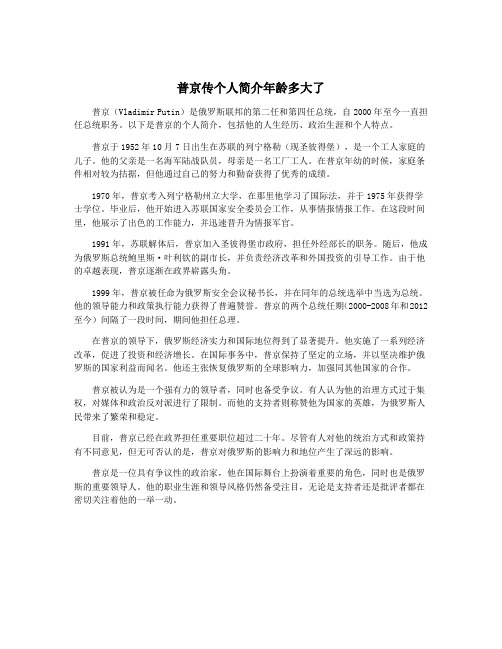
普京传个人简介年龄多大了普京(Vladimir Putin)是俄罗斯联邦的第二任和第四任总统,自2000年至今一直担任总统职务。
以下是普京的个人简介,包括他的人生经历、政治生涯和个人特点。
普京于1952年10月7日出生在苏联的列宁格勒(现圣彼得堡),是一个工人家庭的儿子。
他的父亲是一名海军陆战队员,母亲是一名工厂工人。
在普京年幼的时候,家庭条件相对较为拮据,但他通过自己的努力和勤奋获得了优秀的成绩。
1970年,普京考入列宁格勒州立大学,在那里他学习了国际法,并于1975年获得学士学位。
毕业后,他开始进入苏联国家安全委员会工作,从事情报情报工作。
在这段时间里,他展示了出色的工作能力,并迅速晋升为情报军官。
1991年,苏联解体后,普京加入圣彼得堡市政府,担任外经部长的职务。
随后,他成为俄罗斯总统鲍里斯·叶利钦的副市长,并负责经济改革和外国投资的引导工作。
由于他的卓越表现,普京逐渐在政界崭露头角。
1999年,普京被任命为俄罗斯安全会议秘书长,并在同年的总统选举中当选为总统。
他的领导能力和政策执行能力获得了普遍赞誉。
普京的两个总统任期(2000-2008年和2012至今)间隔了一段时间,期间他担任总理。
在普京的领导下,俄罗斯经济实力和国际地位得到了显著提升。
他实施了一系列经济改革,促进了投资和经济增长。
在国际事务中,普京保持了坚定的立场,并以坚决维护俄罗斯的国家利益而闻名。
他还主张恢复俄罗斯的全球影响力,加强同其他国家的合作。
普京被认为是一个强有力的领导者,同时也备受争议。
有人认为他的治理方式过于集权,对媒体和政治反对派进行了限制。
而他的支持者则称赞他为国家的英雄,为俄罗斯人民带来了繁荣和稳定。
目前,普京已经在政界担任重要职位超过二十年。
尽管有人对他的统治方式和政策持有不同意见,但无可否认的是,普京对俄罗斯的影响力和地位产生了深远的影响。
普京是一位具有争议性的政治家,他在国际舞台上扮演着重要的角色,同时也是俄罗斯的重要领导人。
介绍普京英语作文高中
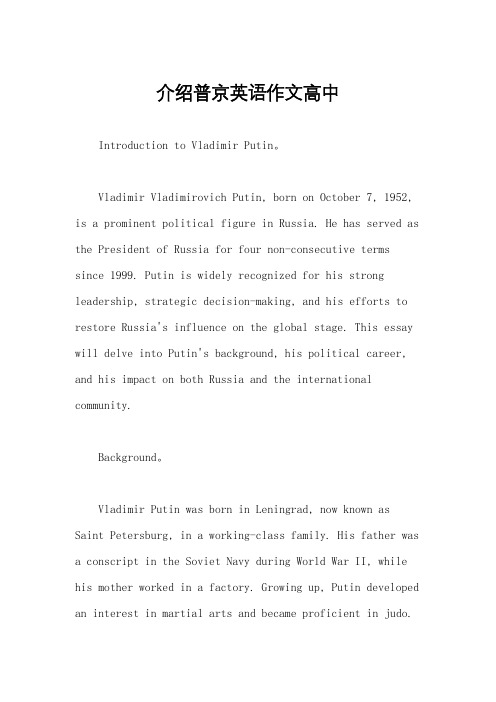
介绍普京英语作文高中Introduction to Vladimir Putin。
Vladimir Vladimirovich Putin, born on October 7, 1952, is a prominent political figure in Russia. He has served as the President of Russia for four non-consecutive terms since 1999. Putin is widely recognized for his strong leadership, strategic decision-making, and his efforts to restore Russia's influence on the global stage. This essay will delve into Putin's background, his political career, and his impact on both Russia and the international community.Background。
Vladimir Putin was born in Leningrad, now known as Saint Petersburg, in a working-class family. His father was a conscript in the Soviet Navy during World War II, while his mother worked in a factory. Growing up, Putin developed an interest in martial arts and became proficient in judo.This discipline and determination would later shape his political career.Education and Early Career。
介绍普京英语作文高中

介绍普京英语作文高中英文回答:As the President of the Russian Federation, Vladimir Putin has been making headlines for his policies and actions both at home and abroad. With his rise to power, many have questioned his motivations and intentions, particularly regarding his foreign policy. In this essay, I will delve into the topic of Putin's foreign policy, exploring its key themes, goals, and implications for Russia's role in the world.First and foremost, it is crucial to note that Putin's foreign policy is heavily influenced by his worldview and vision for Russia. Putin, a former KGB officer, has consistently emphasized the importance of a strong and independent Russia. He believes that Russia has been historically marginalized and mistreated by the West, and he is determined to assert its rightful place on the world stage. This sense of national pride and resentment hassignificantly shaped his approach to foreign affairs.One of the central pillars of Putin's foreign policy is the restoration of Russia's influence in its former sphere of influence, which includes countries like Ukraine, Georgia, and Belarus. Putin views these countries as integral to Russia's security and economic interests, and he has been willing to use military force to ensure their loyalty. The annexation of Crimea in 2014 and the ongoing conflict in eastern Ukraine are prime examples of this strategy.However, Putin's ambitions are not limited to its neighboring nations. He has also sought to expand Russia's influence globally, challenging the dominance of the United States and its allies. Putin has forged strategic partnerships with countries like China and Iran, and he has been active in promoting a multipolar world order where Russia is not beholden to any single superpower. This ambition has led to tensions with the West, particularly over issues such as Syria and arms control.It is important to note that Putin's foreign policy is not merely driven by geopolitical considerations. It is also shaped by a deep-seated belief in traditional values and a rejection of Western liberalism. Putin has portrayed himself as a defender of the Russian Orthodox Church and has fiercely opposed initiatives promoting LGBTQ rights. He has also criticized the West for its perceived moral decline and cultural imperialism. These ideological beliefs have contributed to Russia's increasingly isolationist and conservative stance in international affairs.In conclusion, Vladimir Putin's foreign policy is a complex and multi-faceted phenomenon. It is driven by a desire to restore Russia's influence, challenge Western dominance, and promote traditional values. While Putin's policies have achieved some successes, they have also led to increased tensions and isolation. The long-term implications of his foreign policy for Russia and the world remain to be seen.中文回答:作为俄罗斯联邦总统,普京的政策和行为无论在国内还是国外都备受关注。
普京英文简介

普京英文简介弗拉基米尔弗拉基米罗维奇普京,俄罗斯第2、4任总统,致力于复兴俄罗斯超级大国地位,下面是我为你整理的普京英文简介,盼望对你有用!弗拉基米尔弗拉基米罗维奇普京早年生涯Putin was very naughty childhood, sixth grade when the first few players.In 1975, Putin graduated from the Department of Law at the University of Leningrad, with a Ph.D. in Economics (Associate Professor, National Institute of Mining, St. Petersburg). He then joined the KGB and worked in the Leningrad district. During this time he was familiar with Sergei Ivanov, who later served as Russian Defense Minister. He joined the Communist Party of the Soviet Union in college, and has so far failed to formally declare his party.In 1976, Putin completed the training of the KGB, two years later he entered the Leningrad intelligence agencies confidential departments. He worked in this department until 1983, and then studied at the KGB School in Moscow for one year.From 1985 to 1990, the KGB sent Putin to East Germany, and Putin received a secondary job locally. But the data show that the so-called secondary work is actually a spy task, Putin in East Germany wascollected at the time of West Germanys economic intelligence. After the reunification of the two German, Putin was recalled Leningrad, then, Putin again in the Leningrad University Department of international affairs to get a job.弗拉基米尔弗拉基米罗维奇普京从政经受On August 20, 1991, he resigned his position in the intelligence agency during the KGB plan to overthrow the Soviet president Mikhail Gorbachev.First deputy mayorAfter the reunification of the two virtues, Putin returned to Leningrad in 1990, served as head of the University of Leningrad University Foreign Affairs Assistant, St. Petersburg City Mayor Advisor, Municipal Council Liaison Committee Chairman and St. Petersburg City, the first deputy mayor.In 1991, Putin served as Chairman of the Leningrad City International Liaison Committee, in charge of the citys foreign economic relations. He was in the performance of the talent, by colleagues praise. In March 1994, Putin was promoted to the first deputy mayor of St. Petersburg and was chair of the International Liaison Committee. He was the left arm of Sobchak, and was heavily reused. Sopchak, wherever he went, took him around, and Putin won the gray archbishop.In 1996, Sobchak was unsuccessful in the mayoral election. Deputymayor Yakovlev was elected mayor. Putin did not want to stay in St. Petersburg, through his fellow, then served as president of the office of President Yeltsin Chubais came to Moscow as deputy director of the Russian Presidential Affairs Authority.In March 1997, Putin served as deputy director of the General Affairs Bureau of the Russian General Office, in charge of legal and foreign economic relations. 3 months later transferred to the Office of the President of the General Administration of Supervision. And soon promoted to the first deputy director of the Office of the President, in charge of the local economy, dealing with local leaders, check the status of local economic relations, in particular, to monitor how they use the central to provide loans.On March 29, 1998, Yeltsin dismissed the post of Secretary of the Russian Federation Security Council, and appointed Putin to succeed. In May, Putin served as the first deputy director of the General Office of the President. In July, Yeltsin also appointed Putin as chairman of the Russian Federal Security Council (formerly KGB). When Prime Minister Kiriyenko held a brief ceremony for Putin at the KGB headquarters, Putin said with passion: I am finally home.As prime ministerOn August 9, 1999, Putin was appointed as one of the three first deputy prime ministers of Russia. After that, the former Prime Ministerled the government down, Russian President Yeltsin designated Putin as prime minister. Yeltsin also announced that he hoped that Putin would be able to inherit his post. Putin also announced that he accepted Yeltsins appointment.In March 1999, Putin became secretary of the Russian Federal Security Council, August 9 was appointed as the first deputy prime minister, acting prime minister.August 16, 1999, the State Duma to 233 votes (84 votes against, 17 abstentions) Putin as Russian Prime Minister.Early presidentOn the evening of December 31, 1999, Yeltsin suddenly announced his resignation. Putin was appointed president on the basis of the Russian Constitution. To this end, originally scheduled for June 2000 held in the Russian presidential election ahead of March 26.On March 27, 2000, the Chairman of the Russian Central Election Commission, Vishniyakov, announced that, based on the preliminary results of the vote, President Putin had more than 50% of the vote, elected the third president of the Russian Federation.Re-elected presidentOn March 14, 2021, Putin was re-elected president and received an absolute majority of 71%.On 13 September 2021, after the Beslan hostage incident, Putinproposed the establishment of an open legislature, and in this form replaced the original Russian direct designated local officials of the system. Putin has also increased its crackdown on terrorism, especially as a result of the penalties for government officials to harbor terrorists. Putin said that Russia has the power to arrest and destroy them from the hiding bodies of terrorists and, if necessary, arrest them abroad.The unified Russian party, supported by Putin, has repeatedly expressed its acceptance of Putin and his thoughts in Putins tenure. In December 2021, the reunification of the Russian party seventh congress passed the program we chose Russia, summed up and stated Putins thought as the partys guiding ideology. The main strategy in this statement is consistent with Putins policy and is the same as the basic idea of Putins State of the Union.Due to the restrictions on the presidency of the Russian constitution, Putin can not continue to participate in the 2021 presidential election. In 2021, Putin in an interview with the G8 reporter that five to seven years of the presidency is completely acceptable, suggesting that he may extend the constitution by extending the presidency. Former Russian President Boris Yeltsin has been opposed to Putins constitutional amendment, and in 2021 the national Duma election victory over the Russian party chairman also said that Putin will not amend the constitution.However, the Constitution does not limit the number of times a person is elected president, so Putin may continue to compete in the presidential position in 2021. Putin may also resign before the election and then participate in the election. Some media also believe that Putin may choose to leave the designated successor and manipulate the Russian political situation behind the scenes, however, on February 1, 2021, Putin publicly denied this possibility. He said: I will not designate the successor, the president of the Russian Federation will be elected through the election. In addition, some people think that Putin may choose to join the unified Russian party and become a leader, so he will occupy a high in the national Duma, And then grasp the real power.December 2021, the reunification of the Russian party and other parties to promote Dimitri Medvedev for the next Russian president, Putin agreed. After Putin was designated as a successor, Medvedev said to nominate Putin as prime minister.In May 2021, Putin became president of the Russian party after the outgoing president. On May 7, the new Russian president, Medvedev, was sworn in after the nomination of Putin as the new prime minister. Putin had previously agreed to serve as prime minister. 8, Putin became prime minister.Three presidentsSeptember 24, 2021, when the Russian President Dmitry Medvedevelection. Medvedev also accepted Putins proposal at the conference, will lead a unified list of Russian party elections, led the party to participate in December 4, 2021 will be held in the new national Duma (House of Commons) elections. At the reunification of the Russian Party Congress, the current Prime Minister Vladimir Putin will participate in the presidential election to be held in March 2021.Putin said that if he was elected president, Medvedev will serve as prime minister, he believes that Medvedev will succeed in leading the government work. He also called on Russian nationals to support the unified Russian party led by Medvedev in the national Duma election.November 27, 2021, unified Russia party held a general meeting, Putin as a Russian party candidate to participate in the 2021 Russian presidential election nomination was unanimously approved. Putin readily accepted the nomination and delivered a speech to explain his political thinking.On March 5, 2021, according to the results of the Russian-Chinese electoral committees vote on 99.3% of the votes, Putins vote was as high as 63.75%, and the second and third Juganov and Prokhorov were 17.19% and 7.82% Of the votes; Zilunovsky and Milonovs votes were 6.23% and 3.85% respectively.Russian President Vladimir Putins inauguration began on May 7, 2021 and reviewed the Presidential Guard in the Chapel Square to openthe third presidents career. According to the constitutional amendment that has been passed, his current presidency will reach 2021.普京相关。
普京传个人简介年龄多大了
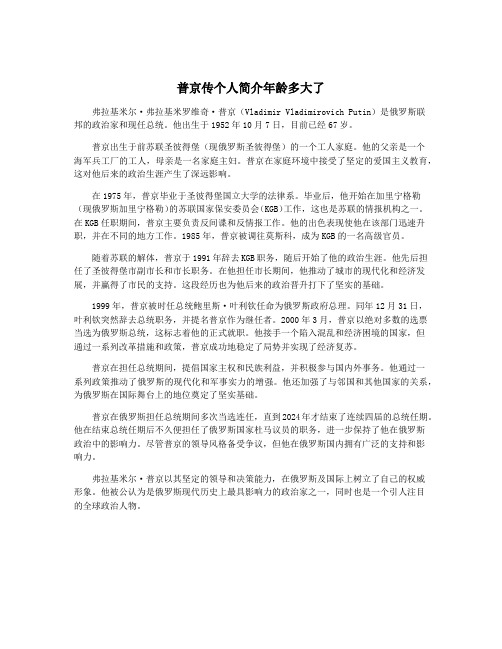
普京传个人简介年龄多大了弗拉基米尔·弗拉基米罗维奇·普京(Vladimir Vladimirovich Putin)是俄罗斯联邦的政治家和现任总统。
他出生于1952年10月7日,目前已经67岁。
普京出生于前苏联圣彼得堡(现俄罗斯圣彼得堡)的一个工人家庭。
他的父亲是一个海军兵工厂的工人,母亲是一名家庭主妇。
普京在家庭环境中接受了坚定的爱国主义教育,这对他后来的政治生涯产生了深远影响。
在1975年,普京毕业于圣彼得堡国立大学的法律系。
毕业后,他开始在加里宁格勒(现俄罗斯加里宁格勒)的苏联国家保安委员会(KGB)工作,这也是苏联的情报机构之一。
在KGB任职期间,普京主要负责反间谍和反情报工作。
他的出色表现使他在该部门迅速升职,并在不同的地方工作。
1985年,普京被调往莫斯科,成为KGB的一名高级官员。
随着苏联的解体,普京于1991年辞去KGB职务,随后开始了他的政治生涯。
他先后担任了圣彼得堡市副市长和市长职务。
在他担任市长期间,他推动了城市的现代化和经济发展,并赢得了市民的支持。
这段经历也为他后来的政治晋升打下了坚实的基础。
1999年,普京被时任总统鲍里斯·叶利钦任命为俄罗斯政府总理。
同年12月31日,叶利钦突然辞去总统职务,并提名普京作为继任者。
2000年3月,普京以绝对多数的选票当选为俄罗斯总统,这标志着他的正式就职。
他接手一个陷入混乱和经济困境的国家,但通过一系列改革措施和政策,普京成功地稳定了局势并实现了经济复苏。
普京在担任总统期间,提倡国家主权和民族利益,并积极参与国内外事务。
他通过一系列政策推动了俄罗斯的现代化和军事实力的增强。
他还加强了与邻国和其他国家的关系,为俄罗斯在国际舞台上的地位奠定了坚实基础。
普京在俄罗斯担任总统期间多次当选连任,直到2024年才结束了连续四届的总统任期。
他在结束总统任期后不久便担任了俄罗斯国家杜马议员的职务,进一步保持了他在俄罗斯政治中的影响力。
- 1、下载文档前请自行甄别文档内容的完整性,平台不提供额外的编辑、内容补充、找答案等附加服务。
- 2、"仅部分预览"的文档,不可在线预览部分如存在完整性等问题,可反馈申请退款(可完整预览的文档不适用该条件!)。
- 3、如文档侵犯您的权益,请联系客服反馈,我们会尽快为您处理(人工客服工作时间:9:00-18:30)。
普京英文简介弗拉基米尔弗拉基米罗维奇普京简介Vladimir Vladimirovich Putin, Russia 2nd President. He served as Russian Prime Minister, President of the Russian Federation, Chairman of the Russian-White Alliance Ministerial Conference.Since the reign of Putin, Putin has been committed to reviving the power of the Russian superpower, strengthening the power of the federal government, rectifying the economic order, combating the financial oligarchy, strengthening the army building; external efforts to improve the international environment, expand diplomatic space, safeguard their interests in the international arena The restoration of the world power status.During the period of Putins presidency, the overall status of Russia after the disintegration of the Soviet Union was enhanced, and it was a lot of controversy in terms of internal and external policies. It was regarded as a "iron fist president" by the American "times", " Forbes "magazine named the worlds most influential people.February 13, 2021, the Russian people on the trust of up to 85% of Putin, a record high. March 11, Putin in the leaders of the wages, ranked eighth. In April, Putin won 6.9% of the vote, leading the US "Time" magazine "the most influential people" list. November 4, 2021, Putin for three consecutive years ranked "Forbes" the worlds most powerful figures first.弗拉基米尔弗拉基米罗维奇普京早年生涯Putin was very naughty childhood, sixth grade when the first few players.In 1975, Putin graduated from the Department of Law at the University of Leningrad, with a Ph.D. in Economics (Associate Professor, National Institute of Mining, St. Petersburg). He then joined the KGB and worked in the Leningrad district. During this time he was familiar with Sergei Ivanov, who later served as Russian Defense Minister. He joined the Communist Party of the Soviet Union in college, and has so far failed to formally declare his party.In 1976, Putin completed the training of the KGB, two years later he entered the Leningrad intelligence agencies confidential departments. He worked in this department until 1983, and then studied at the KGB School in Moscow for one year.From 1985 to 1990, the KGB sent Putin to East Germany, and Putin received a secondary job locally. But the data show that the so-called secondary work is actually a spy task, Putin in East Germany was collected at the time of West Germanys economic intelligence. After the reunification of the two German, Putin was recalled Leningrad, then, Putin again in the Leningrad University Department of international affairs to get a job.弗拉基米尔弗拉基米罗维奇普京从政经历On August 20, 1991, he resigned his position in the intelligence agency during the KGB plan to overthrow the Soviet president Mikhail Gorbachev.First deputy mayorAfter the reunification of the two virtues, Putin returned to Leningrad in 1990, served as head of the University of Leningrad University Foreign Affairs Assistant, St. Petersburg City Mayor Advisor, Municipal Council Liaison Committee Chairman and St. Petersburg City, the first deputy mayor.In 1991, Putin served as Chairman of the Leningrad City International Liaison Committee, in charge of the citys foreign economic relations. He was in the performance of the talent, bycolleagues praise. In March 1994, Putin was promoted to the first deputy mayor of St. Petersburg and was chair of the International Liaison Committee. He was the left arm of Sobchak, and was heavily reused. Sopchak, wherever he went, took him around, and Putin won the "gray archbishop".In 1996, Sobchak was unsuccessful in the mayoral election. Deputy mayor Yakovlev was elected mayor. Putin did not want to stay in St. Petersburg, through his fellow, then served as president of the office of President Yeltsin Chubais came to Moscow as deputy director of the Russian Presidential Affairs Authority.In March 1997, Putin served as deputy director of the General Affairs Bureau of the Russian General Office, in charge of legal and foreign economic relations. 3 months later transferred to the Office of the President of the General Administration of Supervision. And soon promoted to the first deputy director of the Office of the President, in charge of the local economy, dealing with local leaders, check the status of local economic relations, in particular, to monitor how they use the central to provide loans.On March 29, 1998, Yeltsin dismissed the post of Secretary of the Russian Federation Security Council, and appointed Putin to succeed. In May, Putin served as the first deputy director of theGeneral Office of the President. In July, Yeltsin also appointed Putin as chairman of the Russian Federal Security Council (formerly KGB). When Prime Minister Kiriyenko held a brief ceremony for Putin at the KGB headquarters, Putin said with passion: "I am finally home.As prime ministerOn August 9, 1999, Putin was appointed as one of the three first deputy prime ministers of Russia. After that, the former Prime Minister led the government down, Russian President Yeltsin designated Putin as prime minister. Yeltsin also announced that he hoped that Putin would be able to inherit his post. Putin also announced that he accepted Yeltsins appointment.In March 1999, Putin became secretary of the Russian Federal Security Council, August 9 was appointed as the first deputy prime minister, acting prime minister.August 16, 1999, the State Duma to 233 votes (84 votes against, 17 abstentions) Putin as Russian Prime Minister.Early presidentOn the evening of December 31, 1999, Yeltsin suddenly announced his resignation. Putin was appointed president on the basis of the Russian Constitution. To this end, originally scheduledfor June 2000 held in the Russian presidential election ahead of March 26.On March 27, 2000, the Chairman of the Russian Central Election Commission, Vishniyakov, announced that, based on the preliminary results of the vote, President Putin had more than 50% of the vote, elected the third president of the Russian Federation.Re-elected presidentOn March 14, 2004, Putin was re-elected president and received an absolute majority of 71%.On 13 September 2004, after the Beslan hostage incident, Putin proposed the establishment of an open legislature, and in this form replaced the original Russian direct designated local officials of the system. Putin has also increased its crackdown on terrorism, especially as a result of the penalties for government officials to harbor terrorists. Putin said that Russia has the power to "arrest and destroy them from the hiding bodies of terrorists and, if necessary, arrest them abroad."The unified Russian party, supported by Putin, has repeatedly expressed its acceptance of Putin and his thoughts in Putins tenure. In December 20XX, the reunification of the Russian party seventhcongress passed the program "we chose Russia", summed up and stated Putins thought as the partys guiding ideology. The main strategy in this statement is consistent with Putins policy and is the same as the basic idea of Putins "State of the Union".Due to the restrictions on the presidency of the Russian constitution, Putin can not continue to participate in the 20XX presidential election. In 20XX, Putin in an interview with the G8 reporter that "five to seven years of the presidency is completely acceptable," suggesting that he may extend the constitution by extending the presidency. Former Russian President Boris Yeltsin has been opposed to Putins constitutional amendment, and in 20XX the national Duma election victory over the Russian party chairman also said that Putin will not amend the constitution.However, the Constitution does not limit the number of times a person is elected president, so Putin may continue to compete in the presidential position in 20XX. Putin may also resign before the election and then participate in the election. Some media also believe that Putin may choose to leave the designated successor and manipulate the Russian political situation behind the scenes, however, on February 1, 20XX, Putin publicly denied this possibility. He said: "I will not designate the successor, the president of theRussian Federation will be elected through the election." In addition, some people think that Putin may choose to join the unified Russian party and become a leader, so he will occupy a high in the national Duma, And then grasp the real power.December 20XX, the reunification of the Russian party and other parties to promote Dimitri Medvedev for the next Russian president, Putin agreed. After Putin was designated as a successor, Medvedev said to nominate Putin as prime minister.In May 20XX, Putin became president of the Russian party after the outgoing president. On May 7, the new Russian president, Medvedev, was sworn in after the nomination of Putin as the new prime minister. Putin had previously agreed to serve as prime minister. 8, Putin became prime minister.Three presidentsSeptember 24, 20XX, when the Russian President Dmitry Medvedev election. Medvedev also accepted Putins proposal at the conference, will lead a unified list of Russian party elections, led the party to participate in December 4, 20XX will be held in the new national Duma (House of Commons) elections. At the reunification of the Russian Party Congress, the current Prime Minister VladimirPutin will participate in the presidential election to be held in March 20XX.Putin said that if he was elected president, Medvedev will serve as prime minister, he believes that Medvedev will succeed in leading the government work. He also called on Russian nationals to support the unified Russian party led by Medvedev in the national Duma election.November 27, 20XX, "unified Russia" party held a general meeting, Putin as a Russian party candidate to participate in the20XX Russian presidential election nomination was unanimously approved. Putin readily accepted the nomination and delivered a speech to explain his political thinking.On March 5, 20XX, according to the results of theRussian-Chinese electoral committees vote on 99.3% of the votes, Putins vote was as high as 63.75%, and the second and third Juganov and Prokhorov were 17.19% and 7.82% Of the votes; Zilunovsky and Milonovs votes were 6.23% and 3.85% respectively.Russian President Vladimir Putins inauguration began on May 7, 20XX and reviewed the Presidential Guard in the Chapel Square to open the third presidents career. According to the constitutionalamendment that has been passed, his current presidency will reach 2021.普京相关。
